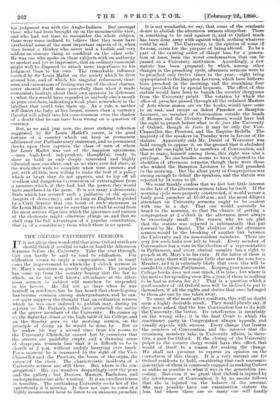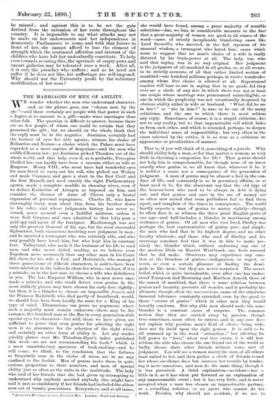THE OXFORD UNIVERSITY SERMONS.
IT is not altogether wonderful that some Oxford residents should think it needful to take in hand the Afternoon Sermons before the University. Take the year through, they can hardly be said to tend to edification. For edification seems to imply a congregation, and in many cases the improvement to which the 2 o'clock sermon in St. Mary's ministers is purely subjective. The preacher has come up from the country hoping that the law to which, as he too well knows, attendance at the after- noon sermon is subject will somehow be suspended in his favour. He did not go there when he was himself in residence, but he has heard that church-going has become common among undergraduates, and he can- not quite suppress the thought that an ordination sermon which he was once induced to publish may, during its sojourn on Mr. Parker's table, have attracted the notice of the graver members of the University. He comes up on the Saturday, dines at the high table of his College, and on the Sunday goes to the morning sermon, on the principle of doing as he would be done by. But as he makes his way a second time from his rooms to the University Church, he cannot but be conscious that the streets are painfully empty, and a dawning sense of dyspepsia reminds him that it is difficult to be in church at 2 p.m. without unduly hurrying over lunch. For a moment be is reassured by the sight of the Vice- Chancellor and the Proctors, the boom of the organ, the voices of the choir. The characteristic incidents of a University sermon are still there. But where is the con- gregation ? His eye wanders despairingly over the pews and the gallery ; but Doctors, Masters, Bachelors, and undergraduates are alike wanting. It is an excellent lesson in humility. The unthinking University reeks not of the opportunity it is missing. It does not care to come at a highly inconvenient hour to listen to an unknown preacher. It is not wonderful„ we- say, that some of the residents desire to abolish the afternoon sermon altogether. Them is- something to be said against it, and at Oxford much: has been done away with against which nothing whatever could be said. The University, in the opinion'of some of. its sons, exists for the purpose of being altered. To be a part of the existing order of things has, for a genera- tion at least, been the worst condemnation that can be passed on a University institution. Accordingly, a new statute has been prepared by which, among other changes in the preaching cycle, afternoon sermons were to be preached only twelve times in the year,--eight being appropriated to the Bampton Lectures, which have •hitherto been preached in the morning, and the remaining four being provided for by special bequests. The effect of this statute would have been to banish the country clergyman from the University pulpit. The rotation by which the office of preacher passed through all the ordained Masters of Arts whose names are on the books, would have come to an end,- and except as Select Preacher or Bampton Lecturer, no member of Convocation outside the heads of Houses and the Divinity Professors, would have had the right to preach before what is de jure the University of Oxford, though de facto it may be only the Vice- Chancellor, the Proctors, and the Esquire Bedells. The majority of the speakers on Tuesday were in favour of the statute. Apparently only Mr. Daniel of Worcester was bold enough to oppose it, on the ground that it abolished almost the one right left to members of Convocation, and that to many, himself among them, this right was also a privilege. No one besides seems to have objected to the abolition of afternoon sermons, though there were those who wished the Bampton Lectures to be still preached in the morning. But the silent party in Congregation was strong enough to defeat the speakers, and the statute was rejected by 54 votes to 29.
We must frankly confess that we feel but little interest in the fate of the afternoon sermon taken by itself. If the morning cycle were properly constructed, it would secure a fairly good preacher at 10.30 a.m., and the most diligent attendant on University sermons ought to be coatent with one in a day. That one would naturally be heard in the morning, so that the chance of getting a congregation at 2 o'clock in the afternoon must always be exceedingly small. The reason why we are glad that the statute was rejected is substantially that put forward by Mr. Daniel. The abolition of the afternoon sermon would be the breaking of another link between the University and its non-resident members. There are very few such links now left to break. Every member of Convocation has a vote in the election of a representative in Parliament, and every clerical member has a right to preach at St. Mary's in his turn. If the latter of these is taken away, there will remain little else save the vote for a Member, and it is extremely likely that even this will be assailed in a future Parliament. Keeping your name on the College books does not cost much, it is true ; but where is the motive for spending even 28s. a year, if there is nothing to be had in return for it ? That is a question which a good number of old Oxford men will be inclined to put to themselves, if all the rights and duties that once belonged to them are one by one taken- away.
To many of the more active residents, this will no doubt seem a highly desirable result. They would plainly say, if they were asked, that the less Convocation has to do with the University, the better. Its interference is invariably on the wrong side ; it is the final Court to which the reactionary party in Congregation always appeals, and usually appeals with success. Every change that lessens the numbers of Convocation, and the interest that the remaining members take in University affairs, is, there- fore, a gain for Oxford. If the closing of the University pulpit to the country clergy would have this effect, that would of itself be a reason for making the change. We shall not presume to express an opinion on the correctness of this theory. It is a very natural one for Oxford residents to hold, considering that- each successive generation of them is commonly engaged in making Oxford as unlike as possible to what it was in the generation pre- ceding. But even if we grant that Oxford is injured by the interference of Convocation, it by no means follows that she is injured on the- balance of the account.
She may possibly have one examination statute the less, but where there are so many one will hardly be missed ; and against this is to be .set the gain derived from the extension of her roots throughout -the country. It is impossible to say what attacks may not be made on her endowments and her independence in democratic Parliaments to come, and with that future in front of her, she cannot afford to lose the element of strength which the continued affection and interest of the children who have left her undoubtedly constitute. To help even towards securing this, the spectacle of empty pews and vacant galleries may be tolerated once a week. After all, it is only the preacher who suffers ; and as he need. not suffer if he does not like, his sufferings are self-imposed. Why should not the University profit by the voluntary mortification of her sons ?







































 Previous page
Previous page